EU referendum 'unlikely' under Labour, says Ed Miliband
- Published
- comments
Ed Miliband: "The Conservative government offers... an all consuming and damaging obsession with whether we should leave the EU"
An EU referendum is "unlikely" to take place if Labour wins the next general election, Ed Miliband has said.
In a speech in London, the Labour leader said there was an "overwhelming economic case" for EU membership.
But he said he did not back an "inexorable" process of political union and Labour would "guarantee" an in-out referendum if the UK was being asked to transfer more powers to Brussels.
David Cameron: "Under Labour there won't be a referendum"
David Cameron said only the Conservatives would "guarantee" a vote.
The prime minister has promised an in/out referendum by the end of 2017 if his party wins an outright majority at the next general election.
Labour has previously backed a referendum, if it is proposed that further powers are transferred to Brussels.
But Mr Miliband has now clarified that this would also be on the single in/out question.
He said the UK was "being dragged to the exit door" under Mr Cameron and he was setting out a "clear lead" on when a referendum would be appropriate.
He promised a "new lock" to guarantee "no transfer of powers without an in/out referendum without a clear choice about whether Britain stays in the EU".
He also criticised the prime minister for creating an "arbitrary timetable", ensuring a "Conservative government would be dominated by an all-consuming and damaging obsession within his party about whether Britain should leave the EU".
Mr Miliband argued EU reforms were required, including:
Completing the single market in energy, services and the digital economy
Lengthening the transitional period during which restrictions can be curbed on immigration from new member states
Making it easier to deport recent immigrants who have broken the law
But these could be achieved without a new treaty, he argued.
'Huge damage' possible
Shadow foreign secretary Douglas Alexander said while it was "unlikely" that a future Labour government would agree to transfer powers to Brussels during the next parliament, it was not "impossible", given the uncertainty over the eurozone's future direction.
The pro-European Labour peer and ex-cabinet minister Peter Mandelson, who is also a former European commissioner, said there was "strong potential consensus" across the EU for the sort of reforms Mr Miliband was proposing.
"Don't have a referendum just for the sake of having one," he said. "It would bring huge damage, a risk to investment and to our economy."
But Labour MP Keith Vaz said: "I'm very happy. It's hugely exciting because this is the first time a Labour leader has said the words 'in/out referendum'. They're only a few words but they're very important.
Lord Mandelson: Miliband's stance on EU referendum is "courageous"
"There's such a move towards federalism within the EU that it's inevitable there will be some kind of transfer of power which means this referendum will happen, even if Ed Miliband seems to think it's unlikely at the moment."
Mr Cameron said Labour's position made "no sense whatsoever" and reflected the party's "we-know-best" approach to politics.
"It is not a proposal for an in/out referendum," he said.
"The British people now have a very, very clear choice. At the next election they can elect a Conservative government that will renegotiate Britain's position in Europe and give people a guaranteed in-out referendum by the end of 2017.
"If they get a Labour government, they will get no referendum, no choice, no reform, nothing. It couldn't be clearer."
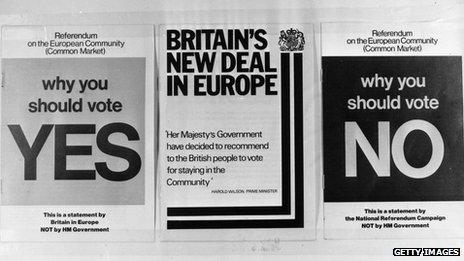
Britons were last asked to vote on membership of the "European Community" in 1975
The coalition has already enshrined in law a so-called referendum lock, promising a vote on whether to transfer further powers to Brussels if the situation arises - but not on whether to leave the EU.
Conservative attempts to legislate for an in/out referendum in 2017 have been thwarted by the Liberal Democrats, which party leader and Deputy Prime Minister Nick Clegg describes as "Britain's only party of in".
'Comments welcome'
Lib Dem Energy Secretary Ed Davey told BBC Radio 4's World at One: "It's the Conservatives who changed position under pressure from their backbenchers and UKIP."
He added: "Clearly it's affecting business decisions, creating uncertainty about whether Britain will have access to the biggest single market in the world."
But UKIP leader Nigel Farage said Mr Miliband had put "himself squarely on the side of the Westminster elite and against the British public".
"He won't support policies to control immigration and now he won't even allow people a vote to take back self-government and the power to control immigration," he added.
The CBI business group welcomed Mr Miliband's comments, saying it "strongly" supported his view "that we are better off in a reformed EU than outside with no influence".
- Published12 March 2014
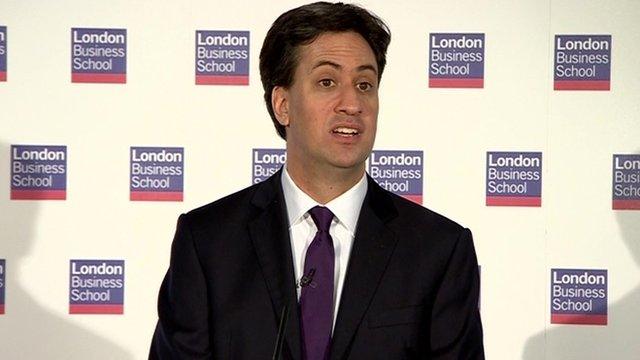
- Published12 March 2014
- Published12 March 2014
- Published21 May 2015
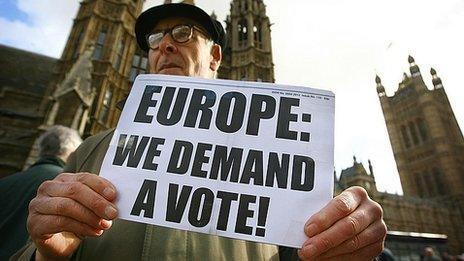
- Published31 January 2014
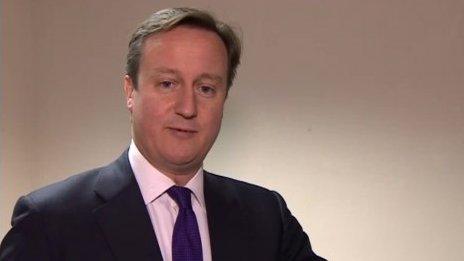
- Published9 March 2014
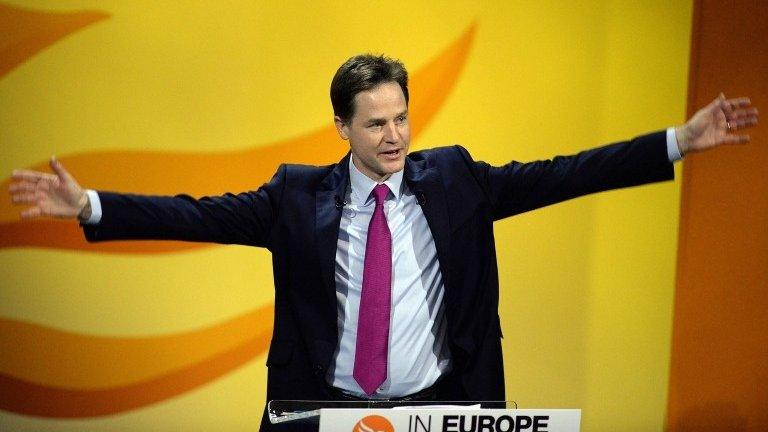
- Published28 January 2014